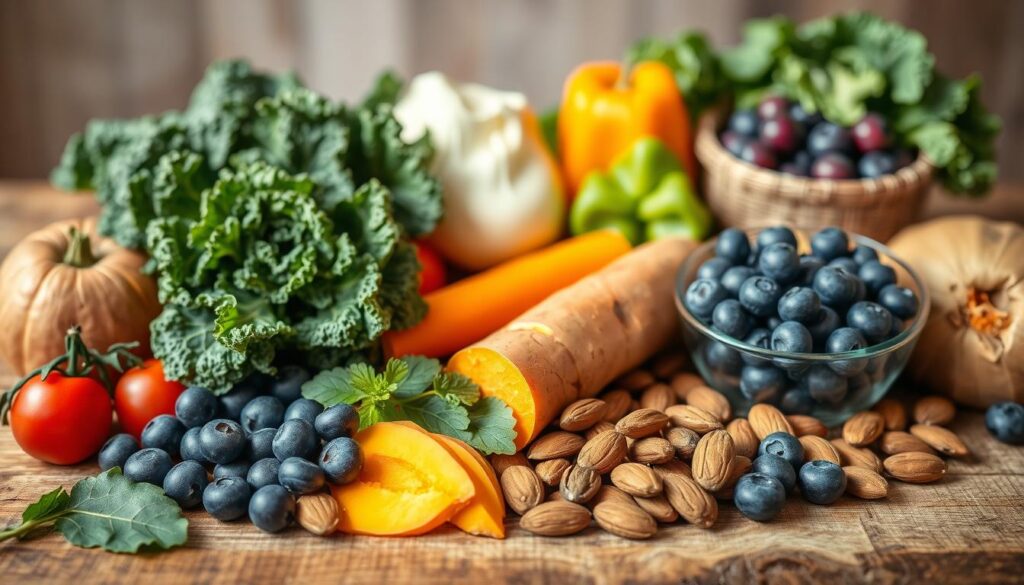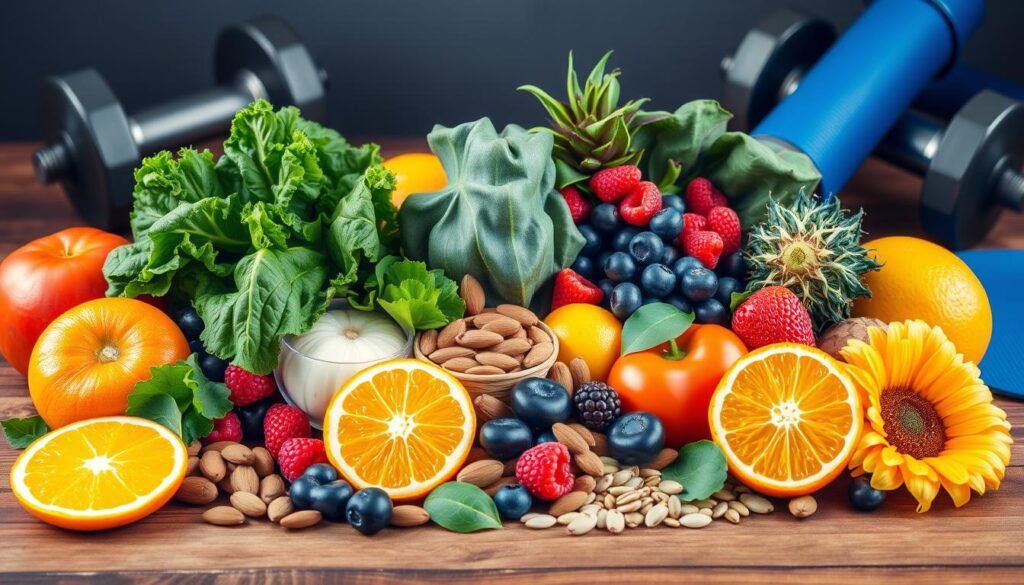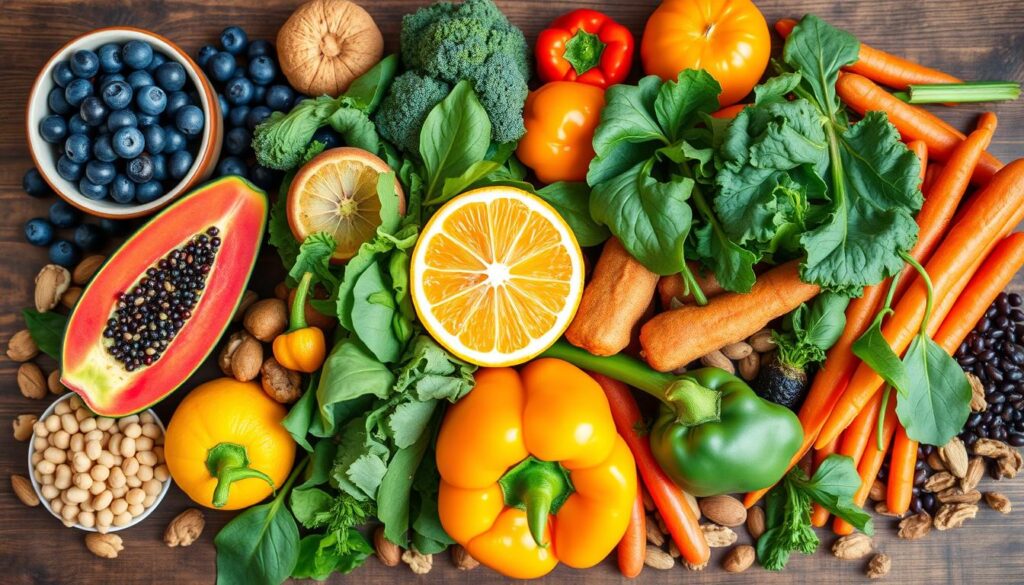Did you know that during hard workouts, muscles burn energy much faster than when you’re resting? This shows how vital micronutrients are in fitness nutrition. They help with energy, muscle repair, and better athletic performance. Eating a balanced diet with lots of whole foods gives you the micronutrients you need. For athletes needing extra help, supplements can be useful.
Recovering from workouts is key, and micronutrients help with that. They lessen muscle pain and boost your immune system. In this article, we’ll dive into why micronutrients are important for fitness. We’ll also talk about how to get them from food and supplements, and how they help with recovery and keeping your immune system strong.
Micronutrients, like vitamins and minerals, are key for fitness nutrition. A smart diet ensures you get enough of them. Knowing how micronutrients help athletes can improve performance and lower injury or illness risks.
Key Takeaways
- Micronutrients are crucial for energy and muscle repair.
- Eating a balanced diet with whole foods gives you the micronutrients you need.
- Supplements can help athletes who need extra support.
- Recovering from workouts is important, and micronutrients help with that.
- A well-planned diet ensures you get enough vitamins and minerals.
- Understanding micronutrients helps athletes perform better and stay healthy.
- Micronutrients are essential for immune health and overall well-being.
Understanding Micronutrients in Nutrition
Micronutrients, like vitamins and minerals, are key in fitness nutrition. They help with energy, muscle growth, and recovery. Eating a variety of whole foods gives you the micronutrients you need for fitness.
It’s important to know how to get the most from the nutrients you eat. This means eating foods full of vitamins and minerals, like citrus fruits and leafy greens. Also, eating whole foods rich in fiber helps with nutrient absorption.

Important micronutrients for fitness include vitamins C and D, and minerals like calcium and iron. You can find these in fruits, vegetables, and lean proteins. By focusing on whole foods and nutrient timing, you can improve your fitness nutrition.
For example, foods like citrus fruits, leafy greens, and nuts are full of vitamins and minerals. They support energy, muscle growth, and recovery. Adding these to your diet and paying attention to nutrient timing can boost your fitness.
The Impact of Micronutrients on Fitness Performance
Micronutrients are key for better energy production, faster muscle recovery, and less injury prevention. They also help with hydration and electrolyte balance. A study of 231 articles with 18,683 athletes showed vitamins and minerals are vital for athletes’ health and performance.
Some important micronutrients for fitness include:
- Vitamin A, which protects cells from damage and aids in muscle recovery
- Vitamin D, which reduces inflammation and boosts muscle protein synthesis
- Iron, crucial for energy production and oxygen transport
Also, hydration and electrolyte balance are key for top performance. Vitamins like A, E, and D affect exercise performance and physical abilities. It’s important to get the daily recommended amount of these nutrients for better energy production, muscle recovery, and injury prevention.

Good hydration and electrolyte balance prevent dehydration and keep performance high. Here’s why micronutrients are important for fitness:
| Micronutrient | Function |
|---|---|
| Vitamin A | Protects cells from exercise-induced damage |
| Vitamin D | Attenuates inflammation and boosts muscle protein synthesis |
| Iron | Essential for energy production and oxygen transport |
In summary, micronutrients are vital for better energy production, muscle recovery, and injury prevention. Good hydration and electrolyte balance are also crucial for top performance.
Essential Micronutrients for Active Lifestyles
For athletes and those who are always on the move, some micronutrients are key. Vitamins like D, C, and E help with immune health, energy, and muscle repair. Minerals such as calcium, magnesium, and iron are important for strong bones, muscles, and energy.
It’s also important to stay hydrated and keep the right electrolyte balance. Athletes might need more B vitamins because they lose them faster. Many athletes, mainly in Canada, Europe, and the northern US, lack vitamin D.

To reach their fitness goals, athletes should eat a balanced diet. This includes fruits, veggies, whole grains, and lean proteins. They should also drink lots of water and use sports drinks or supplements to keep electrolytes in check.
| Micronutrient | Function | Food Sources |
|---|---|---|
| Vitamin D | Bone health, immune function | Fatty fish, fortified dairy products |
| Calcium | Bone health, muscle function | Dairy products, leafy greens |
| Iron | Energy production, oxygen transport | Red meat, poultry, fortified cereals |
How to Incorporate Micronutrients into Your Diet
To get fit, focus on foods that are full of nutrients. These foods give you the micronutrients you need for health. Eating a variety of foods like lean proteins, whole grains, and fruits and veggies is key.
Supplements can help athletes get extra nutrients. But, always talk to a doctor before taking any supplements. Eating a balanced diet with lots of whole foods is best for fitness. Foods rich in micronutrients include:
- Leafy greens, such as spinach and kale, which are rich in iron and calcium
- Nuts and seeds, which are high in magnesium and zinc
- Fatty fish, such as salmon, which is rich in omega-3 fatty acids
- Sweet potatoes, which are high in vitamin A and potassium
Eating these foods and using supplements when needed helps you get all the nutrients for fitness. Always choose whole foods over supplements for the best nutrients.

With a good diet and focus on nutrient-rich foods, you can meet your fitness goals. Whether you’re an athlete or just starting, adding micronutrients to your diet is key for health and wellness.
| Micronutrient | Food Sources | Benefits |
|---|---|---|
| Vitamin C | Citrus fruits, berries, leafy greens | Boosts immune system, aids in iron absorption |
| Calcium | Dairy products, leafy greens, fortified plant-based milk | Essential for bone health, muscle function |
| Iron | Red meat, poultry, fish, beans, lentils | Crucial for healthy red blood cells, prevents anemia |
Common Micronutrient Deficiencies in Athletes
Athletes need the right nutrients to perform well and stay healthy. They often face challenges because their bodies need more nutrients. Getting regular check-ups and fixing any nutrient gaps is key to their health and performance.
Signs and Symptoms to Watch For
Athletes should watch for signs like fatigue, muscle cramps, and slow recovery. These can mean they’re not getting enough nutrients. Spotting these early can help them get the right help.
Risks of Deficiency
Not getting enough nutrients can harm athletes. It can lead to less energy, slower healing, and more injuries. It’s important to fix these issues to stay at the top of their game.
Strategies for Prevention
Athletes should eat a variety of nutrient-rich foods like fruits, veggies, and whole grains. They might also need supplements for iron, vitamin D, and calcium. Regular health checks can help find and fix any nutrient gaps.





















